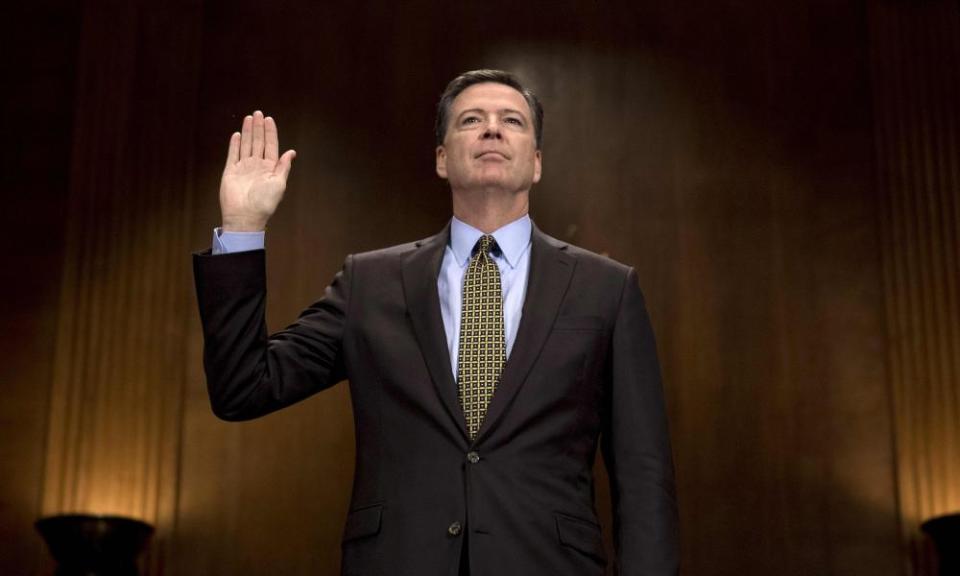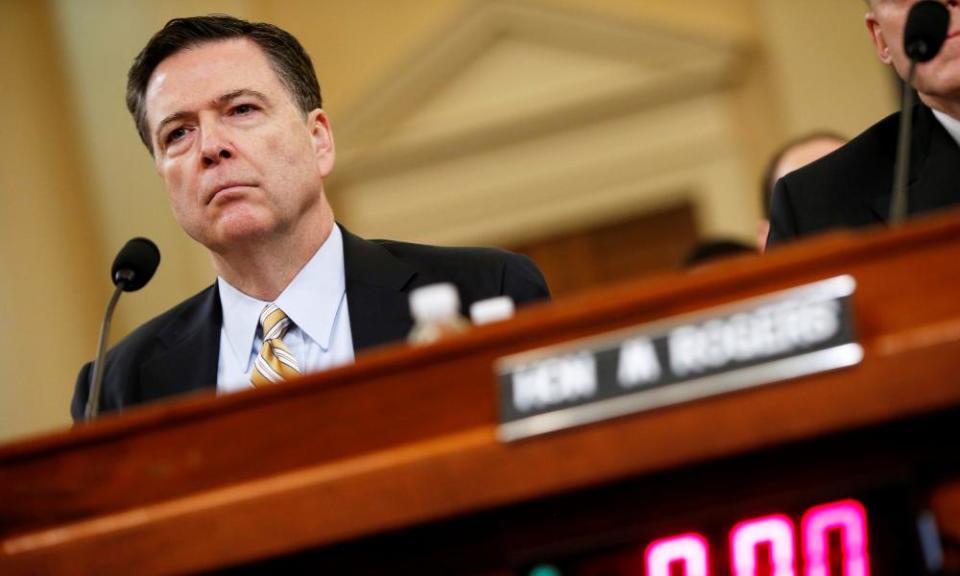James Comey Senate testimony: America braces for a historic political moment
What the former FBI director tells a committee on Thursday could decide whether Trump survives his first term. The stakes have never been higher

When James Comey, the former FBI director, stands before a Senate committee on Thursday to give evidence about the president who fired him, it will be one of the most dramatic moments in US political history.
The stakes will be as high as they have ever been at a congressional hearing. The questions Comey will be asked by the Senate intelligence committee include whether Donald Trump tried to persuade him to stop an investigation into improper contacts between a top adviser and Russian officials, whether Trump sought to extract a vow of personal loyalty, and whether Comey was fired because he did not comply.
Trump has denied trying to make Comey drop the case, but if Comey contradicts him and is supported by other evidence, it would represent potential obstruction of justice by the president and mark a long leap down the road towards impeachment.
Even in the Teapot Dome scandal that shook Warren Harding’s administration in the early 1920s, and in the Watergate affair half a century later, it was not alleged that the president himself tried to intimidate an investigator.
And the context – the possibility of collusion with the Kremlin to skew a presidential election – is far more grave that the issues of bribery and political dirty tricks underpinning those two other historical stains on modern American democracy.
For all those reasons, what Comey says on Thursday could help decide whether Trump survives in office through his first term. That is a milestone that is already in doubt since the appointment on 17 May of a special counsel to take over the broad investigation of Trump campaign links with the Kremlin.
There is speculation that the president might try to seek to invoke executive privilege to stop Comey testifying this week. Citing two senior administration officials, the New York Times reported that Trump will not seek to block Comey’s appearance. Trump spokeswoman Kellyanne Conway, however, would not rule out the option, saying it was up to the president to make that decision.
I don’t think that Jim Comey is going to give a rat’s behind about what Kellyanne Conway has to say
Richard Painter, chief ethics lawyer under George W Bush
Executive privilege would be a desperate gambit. No president has ever tried to use it to stop a former official, who was willing to speak, from giving testimony. Richard Painter, who was chief ethics lawyer in the George W Bush White House, pointed out that having fired the FBI director, Trump has little leverage to stop him speaking.
“I don’t think that Jim Comey is going to give a rat’s behind about what Kellyanne Conway has to say,” Painter said.
In theory, Trump could get the justice department to go to court to get an injunction against Comey testifying, but government lawyers would face an uphill battle. The courts ruled in the course of the Watergate scandal that executive privilege cannot be used to hide inappropriate or unlawful conduct by the executive. And Trump himself has already put the substance of his conversations with Comey in the public domain by giving his version of them, claiming to NBC that the FBI director told him three times he was not under investigation.
“It would be a huge political risk for the White House, given the low chance of success in court and the political costs of failing,” said Matthew Miller, a former justice department spokesman.

The White House has sought to block the congressional investigation of Trump-Russia links in other ways, taking the unprecedented step of instructing government agencies not to comply with requests for information from Democrats. But Trump cannot rely entirely on the loyalty of congressional Republicans. Most importantly, Richard Burr, chairman of the Senate intelligence committee, is showing growing independence from the White House. The most substantive evidence of that shift to date is the committee’s invitation to Comey to give testimony in open session.
There is also very little Trump can do to impede the work of the special counsel, Robert Mueller, who was Comey’s predecessor as FBI director and whose appointment to take over the Russian investigation was a direct and unintended consequence of Comey’s sacking.
Mueller has wide-ranging powers and will be hard to fire. On Friday, he was reported to have expanded the scope of his inquiry to include the lobbying work done by former national security advisor, Michael Flynn, while he was weighing in on US policy in Syria. It was also reported, by the Associated Press, that Mueller has taken over a criminal investigation involving Paul Manafort, Trump’s former campaign chairman, and could also investigate the roles played by attorney general Jeff Sessions and deputy attorney general Rod Rosenstein in the firing of Comey.
Mueller’s investigation will seek to discover if there was collusion between the Trump campaign and a multi-pronged Russian operation to influence the outcome of the 2016 election by hacking and leaking Democratic party emails, the use of propaganda outlets like RT and Sputnik, and spreading fake news on social media.
The circumstantial evidence for such collusion is growing, as more meetings between Trump, his aides and Russian officials come to light, along with evidence that the president’s camp sought to cover up such contacts. It has also emerged, in a report by Yahoo News on Thursday, that in its first few days in office the Trump administration made a priority of trying to lift sanctions on Russia and was only stopped by state department officials raising the alarm in Congress, which moved to take control over the sanctions away from the presidency.
‘A fascinating figure’
The Mueller investigation will take many months, maybe even years. The more immediate threat to the Trump White House comes from Comey. When he takes the oath in the Senate on Thursday it will bring into focus one of the most interesting figures in American public life.
Democrats denounced him as a Republican stooge when he broke with precedent last July and made critical statements about Hillary Clinton’s use of a private email server even as he announced there would be no charges against her. Clinton and her supporters have accused him of killing her campaign by his disclosure, 11 days before the election, that more evidence had been uncovered in the case. It later transpired that evidence amounted to nothing.
But Democrats have reappraised him as a result of his tenacity in pursuing the Trump-Russia investigation after the inauguration and his evident refusal to swear loyalty to Trump. The president switched from lionising Comey to declaring him a “showboat” and a “nut job”.
In reality, the ousted FBI director is a rare species in American politics, a public intellectual with a complicated personal history. He was born in Yonkers, New York, to an Irish Catholic and Democratic family, but turned his back on that inheritance and chose to study at the College of William and Mary in Virginia.
Integrity is important for this guy. This is not someone who will fudge things to advance the career of a politician
Scott Horton, human rights lawyer
There, he abandoned his Catholic faith of his upbringing and experimented with different forms of evangelicalism. He wrote his thesis on how the evangelist preacher Jerry Falwell somehow embodied the teachings of the influential theologian Reinhold Niebuhr, who wrote extensively, in books like Moral Man and Immoral Society, about the intersection of faith, politics and social action, and who was a major influence on Martin Luther King.
As Comey rose through the ranks of the FBI, his politics seem to have moderated to mainstream Republicanism, and his church affiliation drifted from evangelicalism to Methodism. But his interest and attachment to works of Niebuhr remained a constant.
In March, the online magazine Gizmodo reported that Comey had set up a personal Twitter account under Niebuhr’s name.
“I consider him to be a fascinating figure in terms of his background,” said Scott Horton, a human rights lawyer who has studied Comey’s background. “He is a person of the political right, who I think has remained in his heart a movement Republican but who saw the party floating away into something he didn’t recognise. But Niebuhr has always been the guiding light.”
“He clearly thinks about this deeply. Integrity is really important for this guy. This is not someone who will fudge things to advance the career of a politician.”
Karen Greenberg, the director of the centre on national security at Fordham University, said Comey was “a very complicated and thoughtful individual and one who he has a conscience even though it may play out in ways other than how others expect”.
Comey’s appointment with fate on Thursday could turn out to be the most fitting climax in public life for a faithful student of Niebuhr, Greenberg said.
“If you think of moral man caught in an immoral society,” she said, “for someone who truly understands Niebuhr and the inherent conflicts between power and justice, this all has an aura of destiny to it.”
This article was amended on 5 June 2017. A previous version mischaracterized the College of William and Mary as ‘a bastion of southern conservatism’.

